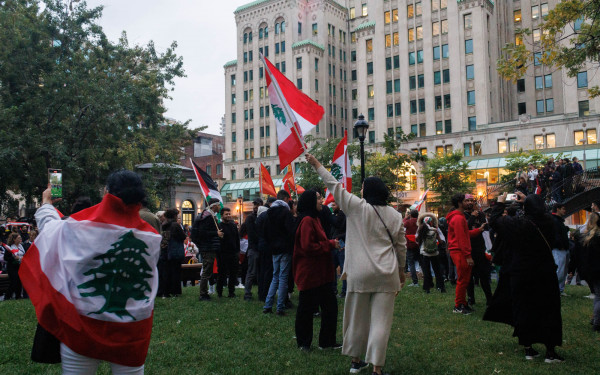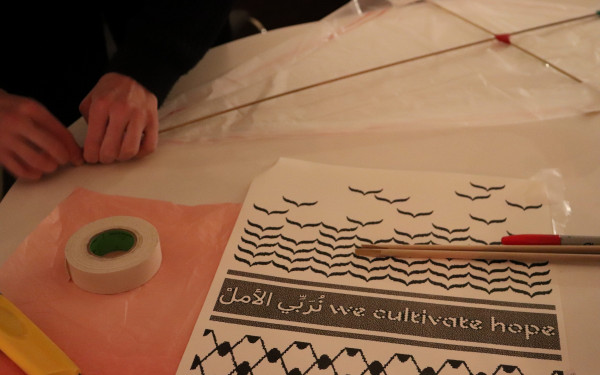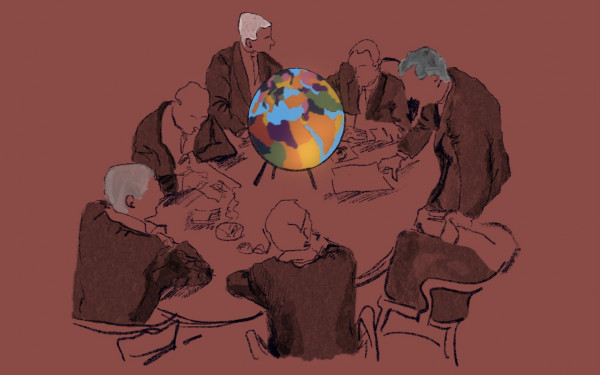The cedar and olive tree are forever interlinked
The solidarity between Palestinian and Lebanese people
In January 2024, Salima Telal, 48, was sitting on her couch with her shisha in hand. The TV was playing while her dog ran around the house. One of her sons was cooking in the kitchen, while the other sat across, listening as she spoke about their 2006 trip to Lebanon.
“We went all the way to Syria, afraid [our car] would get bombed,” Telal said, “with my 8-month-old with 40-degree fever on one side and my 5-year-old on the other.”
The day was July 12, 2006, when Israeli forces invaded Lebanon with air strikes after Hezbollah succeeded at a cross-border raid during an ongoing conflict over land. This resulted in what is called the Second Lebanon War.
Telal and her family drove from Lebanon towards the Syrian border, avoiding impact holes left in the ground by airstrikes. Cars were being bombed left and right. Beirut’s Rafic Hariri International Airport had been bombed. Civilians had few chances to escape.
Telal was one of the few who managed to flee the war in its early stages, returning to Montreal.
“Everybody was scared. It was hell and back,” she said, exhaling the smoke from her shisha.
Telal lived in Beirut, Lebanon for most of her life. She grew up there before coming to Montreal around 25 years ago where she raised her kids. During her visit to Lebanon in 2006, she recalled buildings being destroyed, civilians being bombed and people trying to flee. Water and electricity were restricted and there was no cell service.
“They emptied the city so they could take it over,” Telal said, “like they’ve been [trying to do] to Palestine for years.”
The conflict ended with a ceasefire that was brokered by the United Nations, which came into effect on Aug. 14, 2006, after a month of bombings.
Since 1948, after hundreds of thousands of Palestinians were forced out of their homeland, they have continued fighting for their lives in response to Israel occupying their land and turning cities like Gaza into open-air prisons. As for Lebanon, it has had a strained relationship with Israel since 1982, when it invaded southern Lebanon during the Lebanese Civil War, and with the 2006 Second Lebanon War.
This is why many people in the Lebanese community in Montreal have stood in solidarity with Palestine and continue to do so. This was the case when The Link spoke with Telal in January, and has become especially true now.
On Sept. 23, Israel fired airstrikes across Lebanon. At the time of publication, Israel has killed over 1,000 and wounded at least 6,000 Lebanese people in the attacks, according to Lebanon’s Ministry of Public Health. These are the heaviest tolls since 2006.
In response, Hezbollah fired missiles targeting Israeli military air bases.
From the south of Beqaa to Beirut, hundreds of thousands of residents have been forced to flee, leaving behind their beloved homes, with seemingly nowhere to go. At least 58 towns have been hit with over 1,300 Israeli airstrikes. Before the escalation, Israel had detonated pagers used by Hezbollah, killing 37 and injuring about 3,000 people.
In an interview with CBS, former CIA Director Leon Panetta called the targeted pager attacks on Lebanon a “form of terrorism.”
Reina Sinno, a Lebanese LaSalle College student, said the media does everything in its power to dehumanize Arabs.
“Western media is good at manipulating,” Sinno said. The 20-year-old student sat on the school floor during her break between classes to talk about how she thinks the media views Arabs. Sinno was born in Montreal but lived in Lebanon for the first few years of her life until her family moved back to Quebec.
She keeps in contact with her father, who lives in Lebanon. Over the past 11 months, border skirmishes between Hezbollah and Israel have been happening almost daily, with little to no coverage in the media, Sinno said. Her father said he received daily alerts on his phone about incoming missile strikes.
Sinno said the media only portrays Israel bombing Lebanon as a two-time occurrence, referring to the civil war and the 2006 war, when in reality, it has been happening on and off for the last 37 years.
“They’re portraying it in a lie,” Sinno said.
“Our people, being depressed and struggling for so many years, are ready to die for the cause of Palestine.” — Jean Balka, former fighter in the Lebanese Civil War
On Jan. 3, Israeli forces attacked the Lebanese capital with drone strikes, killing seven people, including Hamas deputy leader Saleh al-Arouri. While this made some noise in the media for a few days, Israel has not officially accepted responsibility for the attack. Israel has been known to censor information in the media regarding their actions.
Jean Balka, 61, was not surprised at the avoidance of accountability. In a phone interview, he alleged, “Habibti, the media is controlled by Israel. How could you put stuff out against yourself?”
Balka is a former fighter in the Lebanese Civil War and fought for the Christian side. They were called the Lebanese Front and consisted of national Maronites who were against Palestinian militancy in Lebanon. Despite disagreeing with the politics, Balka was forced to fight for the Lebanese Front rather than the Lebanese National Movement.
After the war, he went to New York and has been living both there and in Montreal since.
He spoke on his recent experience of being an Arab man in the Western World after the current war broke out. Sometime in early January, Balka was on his way to New York, a drive he has routinely done for the last 33 years, when he was stopped at the border.
“I’m going to ask you some questions,” the man in the uniform said. “Are you Muslim or Christian?”
He had never been asked this question before.
“Since 9/11, us Arabs are viewed as terrorists and murderers,” Rayane Sakr said as she sipped her coffee at the local Second Cup Cafe in the cold December weather.
Sakr is the child of Lebanese immigrant parents and has felt the struggle of being an Arab-Muslim woman in today’s society. Over the sound of coffee beans getting ground, the 19-year-old said, “We aren’t viewed as humans.”
“They have lives, they go to school, they have hopes, they do birthday parties, they get married, they do their makeup, they dance,” she added, her voice trembling. “They are human!”
In January, there were over 250,000 Palestinian refugees in Lebanese refugee camps. Now, with many camps being destroyed, the stateless refugees have the possibility of living in poverty and facing harsh legal discrimination in Lebanon.
Despite the daily fear, many individuals in the Lebanese community are confident in their nation’s ability to defend itself if the occasion arises.
“Our people, being depressed and struggling for so many years, are ready to die for the cause of Palestine,” Balka said.
The Arab community in Montreal has mobilized for Palestine with protests drawing hundreds to thousands, raising awareness of the situation.
“At the protests, you see so many Lebanese flags because we know we can expect it too,” Sinno said.
Balka believes going to protests in support of the Arab community won’t make a difference.
“Free Palestine! Free Palestine!” Balka shouted, “Free Palestine, but no one listens!”
“The more awareness you spread, the more people will try to help and put pressure on foreign governments to go for a ceasefire,” Telal said.
However, spreading awareness both online or in person brings hope to those worried about their communities. Telal said the media is finally giving a voice to the Palestinian people and the Arab community.
“You don’t have to carry a gun to be a fighter for a cause,” Telal said. “A fighter can be a musician, a writer, a politician, a protester, a donator. Could be anything.”
For privacy and security reasons, the name 'Salima Telal' is a pseudonym.







